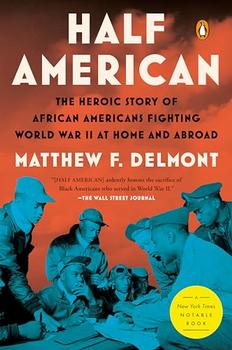Summary | Excerpt | Reviews | Beyond the Book | Readalikes | Genres & Themes | Author Bio

The Epic Story of African Americans Fighting World War II at Home and Abroad
by Matthew Delmont
When I started digging into the archival records and military documents regarding the work Black troops did during the war, it became clear to me not only that African Americans served bravely during the war, but that the United States would not have won World War II without the unsung contributions of Black troops.
A global war entailed logistics on a scale that surprised even America's military planners. Indeed, while fighting across the Pacific, Europe, North Africa, and Asia, the U.S. military required unprecedented amounts of food, fuel, medical supplies, ammunition, and other materials. Beyond being a battle of strategy and will, World War II was a battle of supply. Black Americans were engineers, quartermasters, construction workers, and supply troops who together formed the backbone of the U.S. military's logistical forces. Black truck drivers moved supplies from ports to the battlefronts; general service regiments cleared jungles, constructed roads, and built runways; navy construction battalions made ports and cleared beaches that enabled Allied invasions; and the Merchant Marine transported troops and supplies around the globe. Black troops fought courageously when given the opportunity in combat, but it was this behind‑the‑scenes support and supply work that helped the Allies win the war. These Black worker soldiers were largely invisible to white America, but Black journalists sung their praises during and after the war. "I can truthfully report that the record of the American Negro in World War II matches, if not surpasses that of any white man," New York Amsterdam News journalist Dan Burley wrote just after the war ended. "To him belongs the credit in winning the battle of supply."
As the popular memory of World War II took shape, the experiences of Black veterans remained peripheral. Years of movies and books focusing on D‑Day and platoons in frontline combat have presented a misleading version of how the war was won. From Life's pictorial history of World War II in 1946 to Saving Private Ryan in 1998, white soldiers were presented as the iconic figures of the war. It's hard to overstate the depth of the disrespect to the Black veteran whose sacrifice has been redacted from history. "There are thousands of Black ex‑GIs who will not talk about World War II because for the Black man it was humiliating, degrading, cruel—and not by accident," recalled Staff Sergeant David Cason Jr., a member of the 92nd Infantry Division, which saw combat in Italy. "The treatment of Black soldiers was deliberate, contrived, and planned as well as the Normandy invasion, only the invasion is over but the wounds of the Black soldiers are still raw."
After the war, Black veterans returned to cities and towns that were openly hostile to their presence. Hundreds of veterans were beaten and more than a dozen murdered for being too proud of their uniforms or insufficiently deferential to white people. "The veteran from Okinawa may well be lynched on the streets of a Georgia town if he does not step off the sidewalk when a white woman or man passes," Burley wrote. "He had better not wear his uniform or battle ribbons in Mississippi."
Despite this wave of violence, veterans returned from the war eager to fight for freedom at home. They moved from the "European Theater of Operations to the Southern Theater of Operations," as one veteran put it. For decades after World War II, Black veterans like Hosea Williams, Dovey Johnson Roundtree, Amzie Moore, and Medgar Evers fueled the civil rights movement and fought for the principles of democracy in America. For these veterans and millions of others, winning the war would be only a partial victory if the United States did not also overturn white supremacy and racial discrimination at home.
From Half American by Matthew F. Delmont, published by Viking, an imprint of the Penguin Publishing Group, a division of Penguin Random House LLC. Copyright © 2022 by Matthew F. Delmont.
https://www.penguinrandomhouse.com/books/624655/half-american-by-matthew-f-delmont/




Chance favors only the prepared mind
Click Here to find out who said this, as well as discovering other famous literary quotes!
Your guide toexceptional books
BookBrowse seeks out and recommends the best in contemporary fiction and nonfiction—books that not only engage and entertain but also deepen our understanding of ourselves and the world around us.